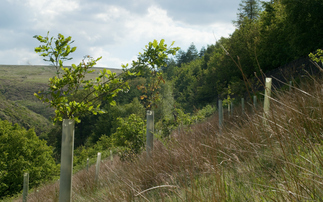150 world leaders and businesses have pledged to end deforestation by 2030. Read the promise here
Forests are essential to our future. More than 1.6 billion people depend on them for food, water, fuel, medicines, traditional cultures and livelihoods.
Forests also support up to 80% of terrestrial biodiversity and play a vital role in safeguarding the climate by naturally sequestering carbon. Yet, each year an average of 13 million hectares of forest disappear, often with devastating impacts on communities and indigenous peoples. The conversion of forests for the production of commodities-such as soy, palm oil, beef and paper-accounts for roughly half of global deforestation. Infrastructure, urban expansion, energy, mining and fuel wood collection also contribute in varying degrees.
We share the vision of slowing, halting, and reversing global forest loss while simultaneously enhancing food security for all. Reducing emissions from deforestation and increasing forest restoration will be extremely important in limiting global warming to 2°C. Forests represent one of the largest, most cost-effective climate solutions available today. Action to conserve, sustainably manage and restore forests can contribute to economic growth, poverty alleviation, rule of law, food security, climate resilience and biodiversity conservation. It can help secure respect for the rights of forest dependent indigenous peoples, while promoting their participation and that of local communities in decision-making.
With our varying mandates, capabilities, and circumstances, collectively we commit to doing our part to achieve the following outcomes in partnership, including by ensuring that strong, large-scale economic incentives are in place commensurate with the size of the challenge:
- At least halve the rate of loss of natural forests globally by 2020 and strive to end natural forest loss by 2030.
- Support and help meet the private-sector goal of eliminating deforestation from the production of agricultural commodities such as palm oil, soy, paper and beef products by no later than 2020, recognizing that many companies have even more ambitious targets.
- Significantly reduce deforestation derived from other economic sectors by 2020.
- Support alternatives to deforestation driven by basic needs (such as subsistence farming and reliance on fuel wood for energy) in ways that alleviate poverty and promote sustainable and equitable development.
- Restore 150 million hectares of degraded landscapes and forestlands by 2020 and significantly increase the rate of global restoration thereafter, which would restore at least an additional 200 million hectares by 2030.
- Include ambitious, quantitative forest conservation and restoration targets for 2030 in the post-2015 global development framework, as part of new international sustainable development goals.
- Agree in 2015 to reduce emissions from deforestation and forest degradation as part of a post-2020 global climate agreement, in accordance with internationally agreed rules and consistent with the goal of not exceeding 2°C warming.
- Provide support for the development and implementation of strategies to reduce forest emissions.
- Reward countries and jurisdictions that, by taking action, reduce forest emissions-particularly through public policies to scale-up payments for verified emission reductions and private-sector sourcing of commodities.
- Strengthen forest governance, transparency and the rule of law, while also empowering communities and recognizing the rights of indigenous peoples, especially those pertaining to their lands and resources.
Achieving these outcomes could reduce emissions by 4.5-‐8.8 billion tons per year by 2030. By working in partnership, we can achieve these goals and chart a new course toward conserving, restoring, and managing healthy forests for the benefit of all. We invite others to join us in committing to a world where people and forests grow together.








